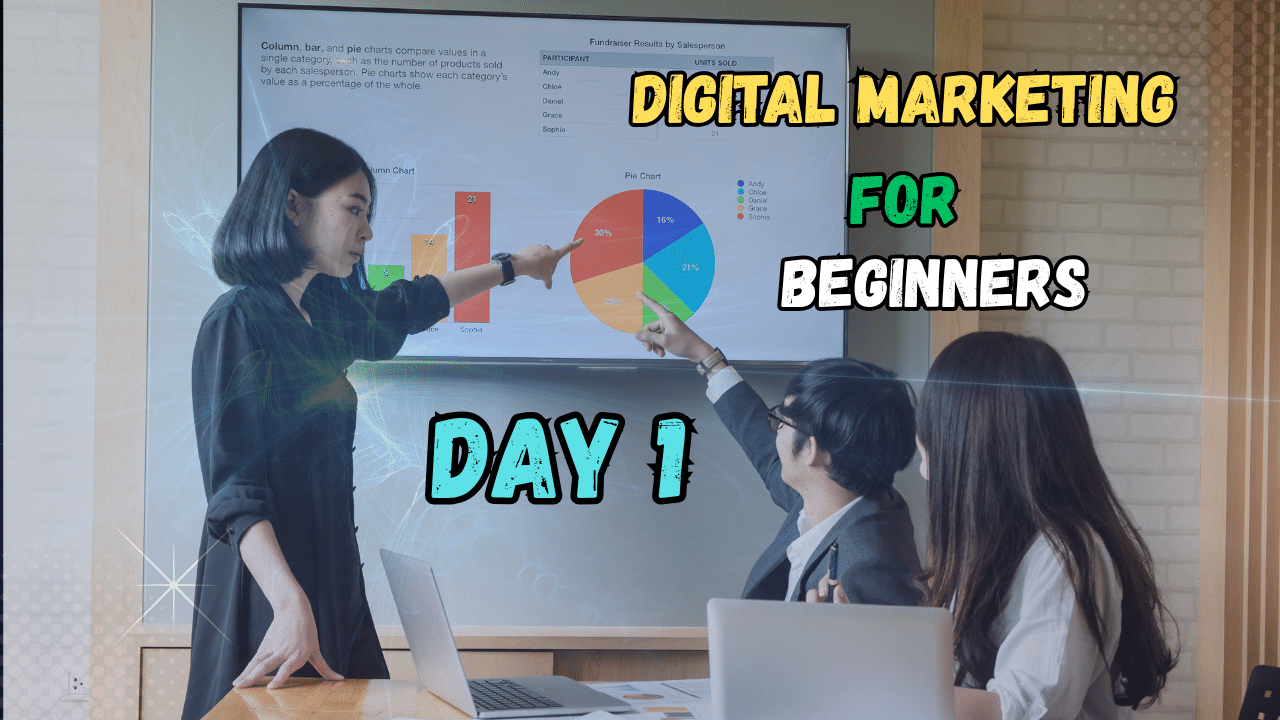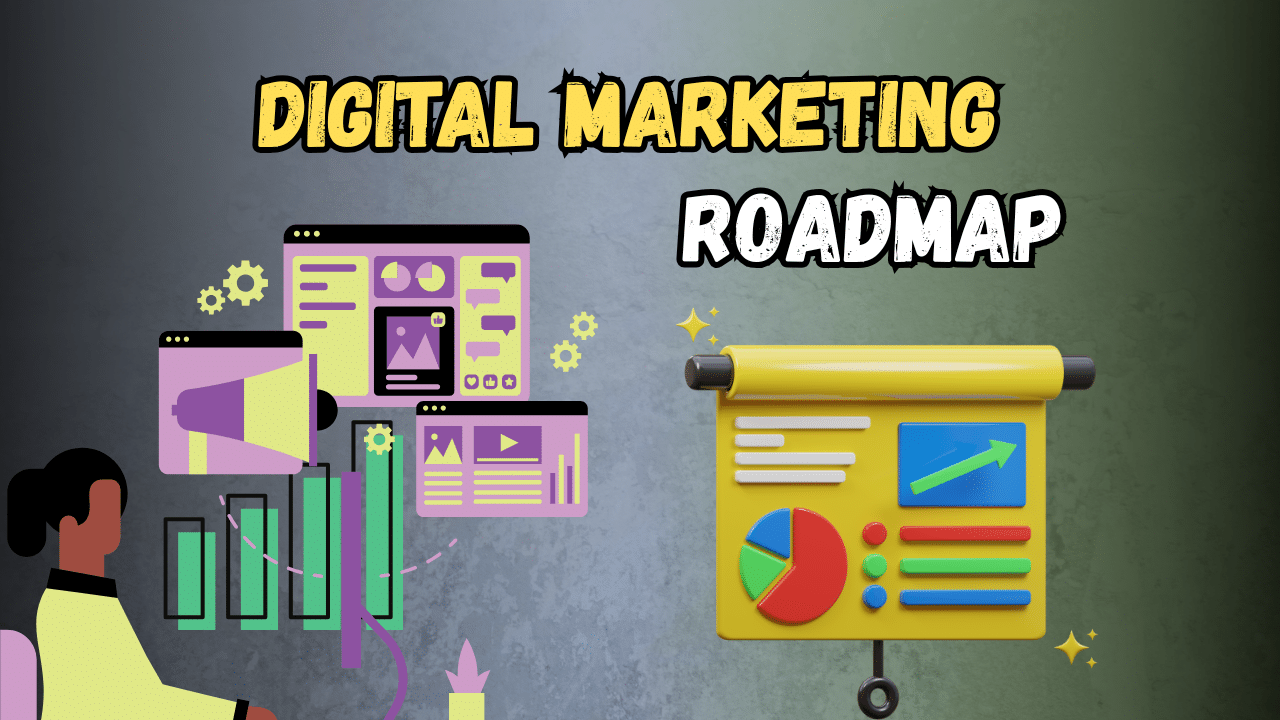Digital marketing for beginners day 1
Introduction
We live in a more connected world than ever. Consider your day: you probably check Instagram when you wake up, Google something in class and maybe even browse Amazon or watch a YouTube video before bed. Our lives revolve around digital experiences.
Assume you are a tiny business owner or perhaps a student presenting a campus event. Where do you go to reach out to others? Online, of course! That’s the reason businesses are shifting their focus to the internet. They understand that their target demographic spends most of their time on online platforms, which is exactly where they want to be. This transition resulted in something powerful and revolutionary: digital marketing.
In this simple introduction, we will look at what digital marketing is and why it is so popular today also how you can get started in this interesting sector.
What is digital marketing?
Digital marketing is the process of marketing products, services or even personal branding through online. It include websites, social media, search engines, mobile applications, email and even messaging applications.
To put it simply digital marketing refers to any sort of marketing that takes place online. It uses the internet and digital technology to connect businesses and potential clients frequently in real time.
For example, when you see a sponsored post while scrolling through Instagram or receive an email newsletter about a product that’s where digital marketing is in action.

Why is Digital Marketing So Crucial Today?
There are still traditional methods of marketing such as television, newspapers, and radio, but they are limited in reach and flexibility when compared to digital marketing. Digital marketing features precise targeting of campaigns, measurable results, and immediate contact with consumers. It’s affordable and versatile enough for use by businesses of every size.
Nowadays, shoppers look up products online prior to buying them. They read reviews, watch videos of things being unboxed, and even price shop from different websites. Without a digital footprint, your company or your brand is leaving behind a huge section of your prospective audience.
In addition, digital marketing levels the playing field. The student who is selling handmade products or the new business launching an app can compete with the larger brands by using creative tactics and understanding how digital approaches work.
Core Elements of Digital Marketing
Let’s discuss the core pillars of digital marketing. These are the ones you must learn in order to master the profession.
First, there’s Search Engine Optimization (SEO). This is the process of improving your website’s visibility on search engines like Google. When someone searches for “best cafes near me,” SEO is what determines whether your cafe shows up in the top results. It involves optimizing content, keywords, site structure and backlinks.
Content Marketing is the next one. This involves producing useful content to draw and capture an audience. Content can be in the form of blog entries, videos, infographics or even podcasts. The intention is to offer informative content that generates trust and prompts individuals to make decisions, such as purchasing a product or subscribing to a newsletter.
Social Media Marketing is another extremely crucial area. It’s all about utilizing platforms such as Instagram, Facebook, LinkedIn, and Twitter to build a brand and engage with users. Social media helps in brand awareness, customer interaction and even driving website traffic.
There is Email Marketing also which is one of the most direct and cost-effective methods. By sending an email list of subscribers, businesses can promote new products, offer promotions or share updates.
Pay-Per-Click (PPC) Advertising is paid advertising where the advertiser only pays if an individual clicks on their ad. Google Ads is a popular PPC network. If targeted correctly, PPC can deliver instant results.
Affiliate Marketing is promoting other people’s products and earning a commission for every sale made through your referral. It’s a great way for influencers and bloggers to earn money.
Lastly, Analytics and Data Analysis is essential to understanding your audience and streamlining your strategy. Google Analytics is but one of the tools that help monitor website traffic, user behavior, and conversions.
Advantages of Studying Digital Marketing as a Student
Acquiring digital marketing skills in school or college days generates different opportunities. First of all, it builds your personal brand. Freelancing, launching your own startup, or landing your dream job—whatever, digital marketing skills distinguish you.
Second, digital marketing is a wide-ranging career. You can freelance, intern or start your own agency. There is a great deal of need for skilled digital marketers and companies are constantly on the lookout for fresh blood with knowledge of the online world.
Also, it provides multiple sources of income. Many students begin by managing Instagram pages, doing content writing, or running Facebook ads for small businesses in their area. These mini-projects add real-world experience to your resume.
Digital marketing also sharpens critical thinking and creativity. You’ll need to analyze what works and what doesn’t and come up with innovative campaigns to engage your target audience.
In addition, digital marketing skills are transferable. Regardless of whether you are in engineering, commerce, or arts, these skills can be used in any profession. Even if you don’t pursue a full time marketing career, they can be applied to build your personal blog, YouTube channel or online portfolio.
How to Get Started with Digital Marketing
Start with one platform to focus on. Content marketing and SEO are good starting points. Begin by creating a simple blog or website and writing about topics you’re passionate about. This gives you hands-on experience writing, keywording, and publishing.
Then build professional social media accounts. Use platforms like LinkedIn to build your professional network. Begin writing useful content, contributing to discussions, and following industry leaders.
Take free or low-cost online courses. Sites such as Coursera, HubSpot, and Google provide SEO, social media, and analytics certifications. These courses establish credibility.
Experiment with mini-projects such as social media management for a local store or a small Facebook ad campaign for a college festival. Practice perfects, and tiny tests will teach you how digital platforms work in real life.
Keep track of your performance. Leverage free tools like Google Analytics and Google Search Console to keep tabs on your blog or website. Learn how people are engaging with your content, and improve from that.
Lastly, never be done learning. Digital marketing continues to change every day. Stay current with sites such as Neil Patel, Moz, and MarketingProfs. Look at YouTube channels that break down new trends and algorithms into easy-to-consume concepts.
Conclusion
Digital marketing is not a buzzword—it’s a set of skills that opens up doors of opportunity. With the digital age, from startups to multinationals, everyone needs a good online presence. Whether you wish to market a side hustle, enhance your college resume, or create a full-time career, learning digital marketing is an investment that pays dividends.
By grasping its fundamental concepts, discovering its tools, and putting your knowledge to work, you can form a strong foundation in this subject. The best part? You don’t need a marketing degree to get started. All it takes is curiosity, consistency, and imagination.
In the upcoming lessons, we’ll dive deeper into specific areas like SEO, social media marketing, and email campaigns. Stick with us, and by the end of this journey, you’ll be well on your way to becoming a confident digital marketer.
Check day 2 here!







